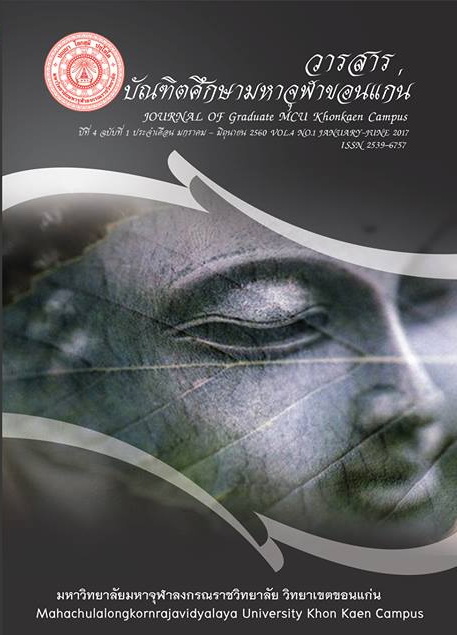การพัฒนาจิตอาสาของครูตามหลักพุทธธรรม
Main Article Content
Abstract
การพัฒนาจิตอาสาของครูตามหลักพุทธธรรม น้อมนำสู่ความเจริญงอกงามในจิตใจของครู ผู้เป็นปูชนียบุคคล อบรมสั่งสอนศิษย์ให้เป็นคนดีมีคุณธรรมเพื่อให้ศิษย์ได้นำความรู้ที่ได้จากการศึกษาเล่าเรียนไปประยุกต์ใช้ในการดำเนินชีวิต ครูที่ดีต้องมีเมตตา กรุณา มุทิตา อุเบกขา ต่อศิษย์ เมื่อเป็นเช่นนี้การพร่ำสอนต้องอาศัยเทคนิคที่แตกต่างกันไปตามความเหมาะสมของลูกศิษย์แต่ละคน ครูที่ดีต้องพัฒนาตนเองให้มีคุณธรรม 4 ประการ คือ 1) มีเมตตา เสียสละ อนุเคราะห์ สงเคราะห์ 2) มีกรุณา โดยฝึกให้เป็นผู้ที่มีความสงสารต่อศิษย์ เมื่อสอนต้องสอนด้วยความกรุณา ใช้วาจาที่ไพเราะซาบซึ้งใจ พูดสุภาพอ่อนโยน 3) มีมุทิตา โดยการฝึกไม่ให้มีความอิจฉาริษยาต่อศิษย์ 4) มีอุเบกขา โดยการฝึกให้มีการปล่อยวางและประพฤติปฏิบัติด้วยความเสมอต้นเสมอปลาย
สังคหวัตถุ 4 อันเป็นคุณธรรมที่เป็นเครื่องยึดเหนี่ยวใจลูกศิษย์ครูต้องเป็นผู้ให้ความรู้ เสียสละ สงเคราะห์ ช่วยเหลือ เอื้อเฟื้อเผื่อแผ่ และแบ่งปัน พูดสุภาพ พูดแนะนำสั่งสอนสิ่งที่เป็นประโยชน์ สร้างประโยชน์ให้กับคนอื่นโดยไม่หวังผลตอบแทน วางตัวให้เหมาะสม ปฏิบัติตนเสมอต้นเสมอปลาย ไม่เอาเปรียบผู้อื่น ร่วมทุกข์ร่วมสุข และสร้างบุคลิกให้น่าเลื่อมใสศรัทธา แล้วครูที่มีจิตดั่งพรหมมีการปฏิบัติด้วยสังคหวัตถุจะเป็นครู ผู้มีจิตอาสาที่น่าเลื่อมใสศรัทธา เป็นพลังในการสร้างสรรค์สังคมและประเทศชาติสืบไป
The development of service mind of teachers based on Buddhadhamma leads to mental prosperity of teachers who are the great masters in teaching their students virtues and application of learnt knowledge in daily life. In their mind, good teachers must have kindness (Pāli: mettā), compassion (Pāli: karuṇā), sympathetic joy (Pāli: muditā) and equanimity (Pāli: upekkhā) towards their students. They must wish their students to have happiness and be optimistic in understanding differences of their students in terms of physical, mental and emotional,. The good teachers must develop themselves to have four virtues as follows: 1) kindness by training themselves to control their anger forgiveness; 2) compassion by training themselves to have pity towards their students, teaching with compassion3) sympathetic joy by training themselves success; and 4) equanimity by training themselves to be neutral and to have constant actions with the application of doctrine called
The bases of social solidarity (Saṅgahavatthu), the virtue that holds the students’ minds. The teachers are responsible for knowledge sharing, being generous, having good and cheerful speech, useful suggestions, giving encouragement, creating harmony, providing assistance in physical, financial and mental aspects, providing public help, When the teachers have their minds as same as that of the Brahma and continuously practice the dhamma of the bases of social solidarity, they will have service mind as the power for positively creating the society and nations.
Article Details
References
มหาจุฬาลงกรณราชวิทยาลัย. (2539). พระไตรปิฎกภาษาไทย ฉบับมหาจุฬาลงกรณราช วิทยาลัย. กรุงเทพมหานคร : โรงพิมพ์มหาจุฬาลงกรณราชวิทยาลัย. มหาวิทยาลัยจุฬาลงกรณราชวิทยาลัย. (2555). พุทธวิธีการสอน. กรุงเทพมหานคร : มหาวิทยาลัยจุฬาลงกรณราชวิทยาลัย. ราชกิจจานุเบกษา. (2556). ข้อบังคับคุรุสภาว่าด้วยมาตรฐานวิชาชีพ พ.ศ. 2556. เล่ม 130 ตอนพิเศษ 130ง. 4 ตุลาคม 2556. สมเด็จพระพุฒาจารย์ อาจ อาสภมหาเถร. (2556). คัมภีร์วิสุทธิมรรค พระพุทธโฆสเถระ รจนา. (พิมพ์ครั้งที่ 11). กรุงเทพมหานคร : บริษัทธนาเพรสจํากัด. อําไพ สุจริตกุล. (2542). คุณธรรมครูไทยในความรู้คู่คุณธรรม รวมบทความเกี่ยวกับคุณธรรม จริยธรรม และการศึกษา. กรุงเทพมหานคร : สํานักพิมพ์แห่งจุฬาลงกรณ์ มหาวิทยาลัย.

